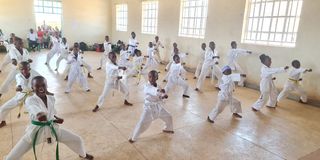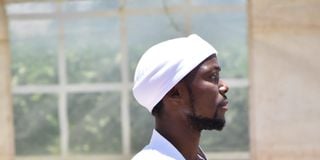Inside Maai Mahiu’s Taekwondo academy changing young lives

Learners at Maaimahiu Taekwondo during one of the practice sessions.
When Timothy Mburu, a 2nd-degree black belt holder in ITF Taekwon-Do, founded the Maai Mahiu Taekwondo Academy, he envisioned it as more than just a martial arts training center.
His mission was to create a space that nurtures discipline, builds character, and guides young people toward positive choices.
“I had a passion for martial arts from a young age. But what really pushed me to start the academy was seeing how many youths in our society are idle. Many of them end up in drugs or immoral behavior. I wanted to create something to guide and mentor them,” says Mburu.
Mburu officially launched the academy in late 2016 and what began with just two students has now grown to currently 30 learners.

Timothy Mburu during training at the Maai Mahiu taekwondo centre.
The academy enrolls children as young as three years old, grouped into various age categories: the development program for ages 3–7, pre-juniors for ages 8–13, juniors for ages 14–17, and a senior category for older teens and adults.
“I chose to focus on those under 18 because mentoring adults is much more difficult. With children, you can shape their mindset early,” Mburu explains.
He says that his own journey into taekwondo began in primary school where he saw a teacher training students in a secondary School.
“There was a teacher who used to train students. I would watch what he did and practice on my own. Eventually, I approached him and asked if I could join. It wasn’t easy to get enrolled, but I managed,” Mburu recalls.
Despite his passion and growing student base, Mburu admits that convincing parents remains a major challenge.
“Many parents still have stereotypes about martial arts. They fear it promotes violence. But we actually follow a structured curriculum, and the students also learn basic life skills and values like discipline and respect,” he assures.
He notes that training sessions take place after school between 5 p.m. and 6 p.m., and on weekends from 2 p.m. While the academy doesn’t charge formal tuition, Mburu only charges a registration fee to support the well-being of the trainees
One of Mburu’s proudest moments came in 2019. “We went to the East African games and took second place. It was a huge achievement,” he says.
Even more fulfilling, however, are the success stories. “There’s a girl I trained who’s now a three-time East African champion and a young man who was on drugs after mentoring him, he turned his life around and even got a job abroad.”
But the journey has not been without hurdles, noting that sometimes the political class makes promises to support them, but end up being empty promises.
“Getting the resources to participate in major tournaments has been hard. Sometimes we miss out because we lack equipment or transport,” he laments.
Looking ahead, Mburu envisions the academy growing into a nationally recognized institution. His goal over the next five years is to position it as one of the best in the country while also increasing community awareness and understanding of taekwondo.
Currently, Mburu serves as the chief trainer, but he is grooming others to join the leadership ranks noting that some are almost qualified.
Mburu expresses a deep sense of fulfillment. Seeing the positive impact the academy has had on their lives, especially when former students return to share how the training and mentorship helped them, reinforces the purpose behind his work.

